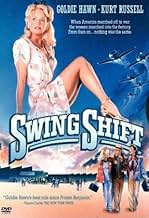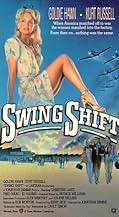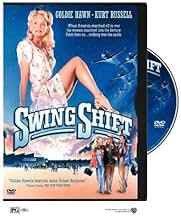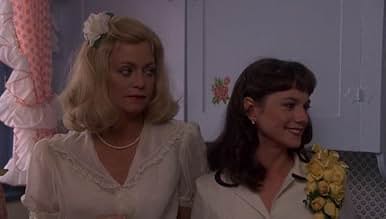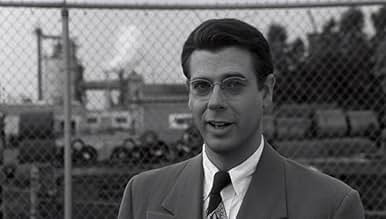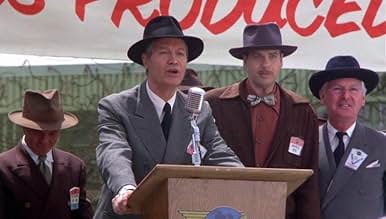IMDb RATING
5.9/10
5.7K
YOUR RATING
A woman finds romance when she takes a job at an aircraft plant to help make ends meet after her husband goes off to war.A woman finds romance when she takes a job at an aircraft plant to help make ends meet after her husband goes off to war.A woman finds romance when she takes a job at an aircraft plant to help make ends meet after her husband goes off to war.
- Nominated for 1 Oscar
- 1 win & 3 nominations total
Danny Darst
- Deacon
- (as Daniel Dean Darst)
Chris Lemmon
- Lt. O'Connor
- (as Christopher Lemmon)
- Director
- Writers
- All cast & crew
- Production, box office & more at IMDbPro
Featured reviews
WWII star-vehicle for Goldie Hawn, here cast as a Rosie the Riveter-type who goes to work in an airplane-parts factory after her husband reports for duty. Poor beginning and hastily-filmed conclusion redeemed somewhat by bright moments in the middle. Hawn seems to realize she's being upstaged by Christine Lahti (as a "tramp" who lives in the same housing complex) and the final moments flip-flop trying to restructure the film's focus in Goldie's favor (check out that final shot). There's nothing wrong with that--Goldie's a wonderful presence and she's very appealing in parts of the movie--but her character as written just isn't all that interesting. As the men vying for Hawn's affections, Kurt Russell and Ed Harris are handsome and serviceable. As for Lahti, she indeed shines, obviously relishing the chance to play against type. I just wish the interaction between Lahti and Hawn had been explored with more depth, but it isn't. This is the fault of the screenwriter (the non-existent "Rob Morton", who is really Bo Goldman, Ron Nyswaner, and Nancy Dowd, here doing a WWII variation on "Coming Home", which Dowd also had a hand in) and also Goldie Hawn, who reportedly fought with director Jonathan Demme over control of the piece. They are all to blame for the slim box-office receipts "Swing Shift" struggled to bring in. **1/2 from ****
"Swing Shift," director Jonathan Demme's sensitive story about women who went to war with a rivet gun, begins the night before the Japanese attack on Pearl Harbor. Living in modest California bungalows, Kay Walsh (Goldie Hawn) and her husband, Jack (Ed Harris) live a simple and enjoyable life. Everything is suddenly changed with the Sunday afternoon announcement of the devastating assault on the Pacific Fleet and the Army Air Corps bases in Hawaii.
Jack enlists immediately as do many of the couple's neighbors and friends. Alone, bored and motivated by genuine patriotism Kay goes to work at an aircraft plant that builds the tough, reliable SBD carrier-borne dive bomber. She strikes up, awkwardly at first, a friendship with neighbor Hazel (Christine Lahti), a woman with a nightclub-owning boyfriend. Jack had made some nasty not sotto voce cracks about her before he left for war.
Kay takes to the assembly line and enjoys being productive. But she's also lonely - it was a long war. Her "leadman," a sort of foreman, is "Lucky" (Kurt Russell). He and she begin a friendship that culminates in one of those wartime affairs that happened very often and is realistically portrayed by Hawn who is torn between marital fidelity and loneliness (and, obviously, dealing with separation-enforced abstinence).
Lucky is a 4-F. That meant he was "physically, mentally or morally unfit" for military service. In his case - phew - it's a latent heart condition.
The affair goes through various stages, punctuated by Jack's surprise arrival on a forty-eight hour pass. Whatever suspecting his wife is having it on with Lucky may do to him, he's also both bemused and confused that as a "leadman," (she's been promoted) she earns more in a factory than he does serving in the Fleet. Harris's portrayal is of a man on the cusp of a social change he feels but can't really identify.
There are a lot of ups and downs in this story but Hawn and Lahti in particular deliver strongly emotional and convincing performances. This was long before women could rise to general officer or flag officer rank and assume major wartime responsibilities. Hawn is Rosie the Riveter, the patriotic but largely uneducated and unskilled patriotic American female. There were tens of thousands of such women employed in every type of industrial work.
Obviously the absence of husbands and the surfeit of available albeit older or not totally fit men aided the initiation of extramarital affairs. But "Swing Shift" also subtly conveys the reality that the women who went to work were empowered by the global conflict. Despite an ending that affirms the women's promise and duty to relinquish employment to returning veterans (the promise was unnecessary since both law and custom insured their rapid dismissal), American women were fundamentally changed by the liberating reality of serving their country by working (often for the first time) and earning money. The political, economic and social reverberations would be felt for decades. "Swing Shift" is fine entertainment but it's also a chronicle of an important aspect of America's Home Front.
A fine movie. Available on DVD in a good transfer with no real special features.
9/10.
Jack enlists immediately as do many of the couple's neighbors and friends. Alone, bored and motivated by genuine patriotism Kay goes to work at an aircraft plant that builds the tough, reliable SBD carrier-borne dive bomber. She strikes up, awkwardly at first, a friendship with neighbor Hazel (Christine Lahti), a woman with a nightclub-owning boyfriend. Jack had made some nasty not sotto voce cracks about her before he left for war.
Kay takes to the assembly line and enjoys being productive. But she's also lonely - it was a long war. Her "leadman," a sort of foreman, is "Lucky" (Kurt Russell). He and she begin a friendship that culminates in one of those wartime affairs that happened very often and is realistically portrayed by Hawn who is torn between marital fidelity and loneliness (and, obviously, dealing with separation-enforced abstinence).
Lucky is a 4-F. That meant he was "physically, mentally or morally unfit" for military service. In his case - phew - it's a latent heart condition.
The affair goes through various stages, punctuated by Jack's surprise arrival on a forty-eight hour pass. Whatever suspecting his wife is having it on with Lucky may do to him, he's also both bemused and confused that as a "leadman," (she's been promoted) she earns more in a factory than he does serving in the Fleet. Harris's portrayal is of a man on the cusp of a social change he feels but can't really identify.
There are a lot of ups and downs in this story but Hawn and Lahti in particular deliver strongly emotional and convincing performances. This was long before women could rise to general officer or flag officer rank and assume major wartime responsibilities. Hawn is Rosie the Riveter, the patriotic but largely uneducated and unskilled patriotic American female. There were tens of thousands of such women employed in every type of industrial work.
Obviously the absence of husbands and the surfeit of available albeit older or not totally fit men aided the initiation of extramarital affairs. But "Swing Shift" also subtly conveys the reality that the women who went to work were empowered by the global conflict. Despite an ending that affirms the women's promise and duty to relinquish employment to returning veterans (the promise was unnecessary since both law and custom insured their rapid dismissal), American women were fundamentally changed by the liberating reality of serving their country by working (often for the first time) and earning money. The political, economic and social reverberations would be felt for decades. "Swing Shift" is fine entertainment but it's also a chronicle of an important aspect of America's Home Front.
A fine movie. Available on DVD in a good transfer with no real special features.
9/10.
Jonathan Demme directed this period piece set during World War II, where women were recruited to take over from men in airplane making factories, because the men had to serve(unless they were declared 4-F).
Goldie Hawn, Christine Lahti, and Holly Hunter play the women, while Ed Harris, Fred Ward, and Kurt Russell play the men. The women must overcome the sexism and skepticism from management, and some of the men left behind. With their husbands gone, the women find that their increased responsibility makes them more involved with the world, but also gives way to some temptations as well...
Surprisingly bland, even lifeless film feels longer than it is, though it does have a good cast, story doesn't hold viewer interest much, and it feels like a wasted opportunity to portray an important part of the home front aspect of the war.
Goldie Hawn, Christine Lahti, and Holly Hunter play the women, while Ed Harris, Fred Ward, and Kurt Russell play the men. The women must overcome the sexism and skepticism from management, and some of the men left behind. With their husbands gone, the women find that their increased responsibility makes them more involved with the world, but also gives way to some temptations as well...
Surprisingly bland, even lifeless film feels longer than it is, though it does have a good cast, story doesn't hold viewer interest much, and it feels like a wasted opportunity to portray an important part of the home front aspect of the war.
A quiet first-rate film that has Goldie Hawn at a factory to produce military goods during World War II while husband Ed Harris is off fighting the war. Hawn would have never thought that she would fall for co-worker Kurt Russell in this fine motion picture. Christine Lahti (Oscar-nominated) shines as another co-worker who has a bad reputation and Fred Ward gives another fine performance in a small supporting role. Directed by Jonathan Demme, "Swing Shift" is one of those diamonds in the rough from the 1980s. A good film. 4 stars out of 5.
It's 1941 Santa Monica. Kay Walsh (Goldie Hawn) is happily married. Her fisherman husband Jack (Ed Harris) enlists after Pearl Harbor. Kay gets a job at the aircraft plant despite Jack's objections. Their lounge singer neighbor Hazel (Christine Lahti) is tired of her manager Archibald 'Biscuits' Touie (Fred Ward) and doesn't like the Walshes either who often snicker at her. Eventually, the two women become best of friends at the sexist plant on the swing shift from four to midnight. Kay starts to fall for her supervisor trumpet player Mike 'Lucky' Lockhart (Kurt Russell).
He's a player hound-dogging a married woman. She doesn't come off that well either. There has to be a higher degree of douchness from Jack to excuse her cheating on him. He is a male chauvinist but not necessarily worst than everybody else including Lucky. As a rom-com, it's very awkward. I really couldn't take the bad romance. For this to work, this has to be a darker drama. All the lightness has to go. Goldie Hawn is the wrong person to go there. There is a wrong tone to the movie. I don't know which version I saw although I suspect it's not the director's cut.
He's a player hound-dogging a married woman. She doesn't come off that well either. There has to be a higher degree of douchness from Jack to excuse her cheating on him. He is a male chauvinist but not necessarily worst than everybody else including Lucky. As a rom-com, it's very awkward. I really couldn't take the bad romance. For this to work, this has to be a darker drama. All the lightness has to go. Goldie Hawn is the wrong person to go there. There is a wrong tone to the movie. I don't know which version I saw although I suspect it's not the director's cut.
Did you know
- TriviaIn an early scene, Ed Harris, clad only in a towel wrapped around his waist, plops down on a chair. For a split second, his genitals are fully exposed. This scene somehow evaded the censors (and in a PG-rated film) and in the first video release, the scene is intact. The scene has now disappeared from subsequent releases. However, it is included on the print shown on Turner Classic Movies.
- GoofsWhen the service men are boarding the bus, and Kay is saying goodbye to her husband, a man appears with a megaphone to announce the bus is departing. His megaphone is a self-contained transistor one which was not available in 1941.
- Quotes
Documentary Narrator: Each returning serviceman will get his job back when the war is won. And you girls and women, you'll be going home. Back to being housewives and mothers as you promised to do when you came to work with us. Your lives will return to normal.
- Crazy creditsOpening credits are shown over old, black and white photos.
- Alternate versionsCBS edited 5 minutes from this film for its 1987 network television premiere.
- SoundtracksSomeone Waits For You
Performed by Carly Simon
Produced by Richard Perry
Music by Peter Allen
Lyrics by Will Jennings
- How long is Swing Shift?Powered by Alexa
Details
- Release date
- Country of origin
- Language
- Also known as
- Swing Shift - Liebe auf Zeit
- Filming locations
- Long Beach, California, USA(bicycling sequence)
- Production companies
- See more company credits at IMDbPro
Box office
- Budget
- $15,000,000 (estimated)
- Gross US & Canada
- $6,650,206
- Opening weekend US & Canada
- $2,270,136
- Apr 15, 1984
- Gross worldwide
- $6,650,206
- Runtime1 hour 40 minutes
- Color
- Sound mix
- Aspect ratio
- 1.85 : 1
Contribute to this page
Suggest an edit or add missing content



